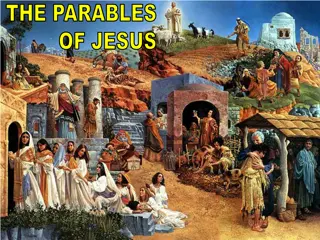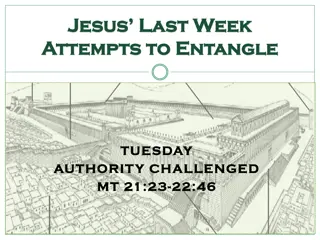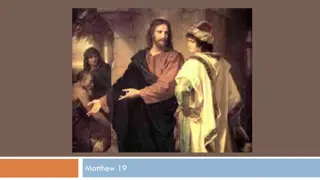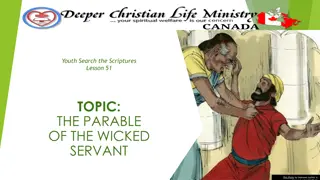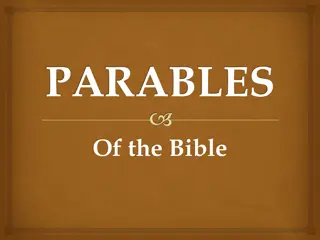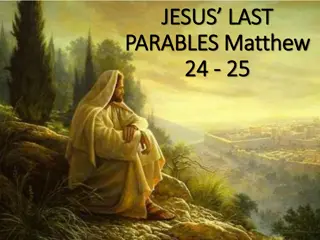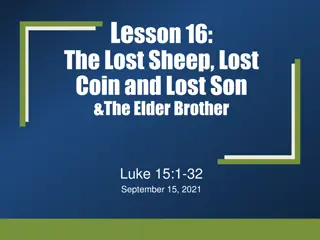
Understanding the Three Parables from Matthew 25
Delve into the parables of the sheep and goats, talents, and 10 virgins as explained in Matthew 25, reflecting on their deeper meanings and teachings for spiritual growth and readiness. Explore insights on faith, preparedness, and the symbolism of oil in these biblical narratives.
Uploaded on | 0 Views
Download Presentation

Please find below an Image/Link to download the presentation.
The content on the website is provided AS IS for your information and personal use only. It may not be sold, licensed, or shared on other websites without obtaining consent from the author. If you encounter any issues during the download, it is possible that the publisher has removed the file from their server.
You are allowed to download the files provided on this website for personal or commercial use, subject to the condition that they are used lawfully. All files are the property of their respective owners.
The content on the website is provided AS IS for your information and personal use only. It may not be sold, licensed, or shared on other websites without obtaining consent from the author.
E N D
Presentation Transcript
Three parables Matthew 25 Parable of the sheep & goats Parable of the Talents Parable of the 10 Virgins
[A young returned missionary shared during a testimony meeting] He told of coming home from a date shortly after he had been ordained an elder at age 18. Something had happened on this date of which he was not proud. He did not go into any details, nor should he have done so in a public setting. To this day I do not know the nature of the incident, but it was significant enough to him to have affected his spirit and his self-esteem. As he sat in his car for a while in the driveway of his own home, thinking things through and feeling genuine sorrow for whatever had happened, his nonmember mother came running frantically from the house straight to his car. In an instant she conveyed that this boy s younger brother had just fallen in the home, had hit his head sharply and was having some kind of seizure or convulsion. The nonmember father had immediately called for an ambulance, but it would take some time at best for help to come.
Come and do something, she cried. Isnt there something you do in your Church at times like this? You have their priesthood. Come and do something. On this night when someone he loved dearly needed his faith and his strength, this young man could not respond. Given the feelings he had just been wrestling with and the compromise he felt he had just made whatever that was he could not bring himself to go before the Lord and ask for the blessing that was needed ( The Confidence of Worthiness, Liahona,Apr. 2014, 58 59).
How many were there? How many were wise? How many were foolish? How many had oil? How many had enough oil (in vessles?) How many were sleeping when the bridegroom came? What does the oil represent? Matthew 25:1-13 Matthew 25
is chilling. The ten virgins obviously represent members of Christ's Church, for all were invited to the wedding feast and all knew what was required to be admitted when the bridegroom came. But only half were ready when he came. (Elder Dallin H. Oaks, CR April 2004, 6) The arithmetic of this parable Matthew 25
Why was the Lord so mean? Were the ones with oil mean ? Matthew 25
This was not selfishness or unkindness. The kind of oil that is needed to illuminate the way and light up the darkness is not shareable. How can one share obedience to the principle oftithing; a mind at peace from righteous living; an accumulation of knowledge? How can one share faith or testimony? How can one share attitudes or chastity, or the experience of a mission? How can one share temple privileges? Each must obtain that kind of oil for himself. In the parable, oil can be purchased at the market. In our lives the oil of preparedness is accumulated drop by drop in righteous living. Each act of dedication and obedience is a drop added to our store (Faith Precedes the Miracle[1972], 255 56). Matthew 25
What does the oil represent? What does the vessel represent? D&C 45:56-57 Matthew 25
the Church of Jesus Christ and not the rank and file of the world... The foolish virgins were not averse to buying oil. They knew they should have oil. They merely procrastinated... In the parable, oil can be purchased at the market. In our lives the oil of preparedness is accumulated drop by drop in righteous living. Attendance at sacrament meetings adds oil to our lamps, drop by drop over the years. Fasting, family prayer, home teaching, control of bodily appetites, preaching the gospel, studying the scriptures--each act of dedication and obedience is a drop added to our oil with which we can at midnight refuel our exhausted lamps." (President Spencer W. Kimball, Faith Precedes the Miracle, pp. 253-56) "I believe that the Ten Virgins represent the people of Matthew 25
Why was the Lord so mean? What does the oil represent? What does the vessel represent? D&C 45:56-57 Oil = Conversion through the Holy Ghost Vessel = Testimony of the Gospel Matthew 25
Parable of the talents Write down 10 things you are good at - don t be afraid to brag a bit. What is the difference between talent and ability? Cross Reference to D&C 60:2 and Matt 5:14-16. An ability becomes a talent when we turn it over to the Lord. How many talents do you have from your list of 10 abilities? Matthew 25
Parable of the talents Name people in the (real or scriptural) who turned their abilities into talents to forward the gospel cause. Matthew 25
Once, on a very nice day in Washington Square Park in New York City, my companion and I were contacting in the park with little success. In the park, people were watching some Broadway-quality street dancers. At the end of the performance, my companion approached the dancers with a challenge: We have the fastest man in NYC with us today, and he would like to have a race. Which one of you is the fastest? One of them came out and said, That s me, bro. I m a runner too. The other dancers blocked the street, and the crowd leaving the dance performance was called back. Someone exclaimed, It sthe Mormons! Soon we had a large audience for the race.
My opponent was in athletic dancing clothes. I was in my suit, holding my Book of Mormon. The dancer asked if I wanted to give my suit coat and Book of Mormon to my companion, but I said, I m good. I will run with them. He started the race with, On your mark, get set, go, and took off. I gave him a head start of a couple seconds, and then I began to chase him down. As I passed the dancer, I held up the Book of Mormon and said, The Church is true, bro! and ran on to win the race. Because of this performance, we became very popular in the neighborhood. Many people immediately took pass-along cards, and we made several return appointments. Gospel seeds were planted. I contacted people on the street and invited them to race me if I won, they would agree to come to church. I ran in 77 races on my mission and never lost. (Jason Hinds, June 2012, New Era).
mission president had just arrived. He was excited about returning to his old field of labor in the mission field, the same area in which he had served as a nineteen-year-old missionary. Years previous, he and his senior companion were assigned to open a new city some distance from the mission headquarters. As they arrived in this new city and walked down the street, they passed a church with a minister standing at the front door. As they walked by the church, the minister went in and called to his whole congregation to follow him out into the street. There they followed the missionaries and started calling them names; then they became more violent and started to throw rocks at them. The young elder was excited about this experience his first day in the mission field and already he was being stoned, he thought. Then, a big rock suddenly hit him squarely in the middle of the back, and his feeling changed to anger. Before entering the mission field he had been quite a baseball pitcher; and in the flush of anger he wheeled around, grabbed the first rock he could find on the ground, reared back in his famous pitching pose, and just ready to let the rock fly when suddenly A few years ago I was visiting in Brazil, where a new
all the way to Brazil to throw rocks at people; he was there to teach them the gospel. But what was he to do with the rock in his hand? If he dropped it to the ground, they would think it a sign of weakness and probably continue to throw rocks at them. Yet he could not throw it at the crowd. Then he saw a telephone post some distance away. He reared back and let the rock fly directly at the telephone post, hitting it squarely in the middle. The people in the crowd took a couple of steps back. They suddenly realized that that rock probably could have hit any one of them right between the eyes. Their mood changed; instead of throwing rocks at the missionaries, they began to throw them at the telephone post. After this incident, every time the elder went down that street he was challenged to a rock-throwing contest. The rock-throwing contests led to discussions of the gospel, which led to conversions, which led to the establishment of a branch of the Church in that community. Do you see the talents that we have but we never consider using to help build the Kingdom? I think we ought to use the talents our Father in Heaven has given to us to help this great work grow (Prophecies, Visions, and Dreams, L. TOM PERRY, BYU Speeches, 1979) he realized why he was there. He had not been sent
We spend so much time and energy comparing ourselves to others usually comparing our weaknesses to their strengths. This drives us to create expectations for ourselves that are impossible to meet. As a result, we never celebrate our good efforts because they seem to be less than what someone else does...
Everyone has strengths and weaknesses. Its wonderful that you have strengths. And it is part of your mortal experience that you do have weaknesses. God wants to help us to eventually turn all of our weaknesses into strengths,but He knows that this is a long-term goal. He wants us to become perfect,and if we stay on the path of discipleship, one day we will. It s OK that you re not quite there yet. Keep working on it, but stop punishing yourself (President Uchtdorf, October 2011)
President Faust explained, This church does not necessarily attract great people but more often makes ordinary people great. A major reason this church has grown from its humble beginnings to its current strength is the faithfulness and devotion of millions of humble and devoted [members] who have only five loaves and two small fishes to offer in the service of the Master. Matthew 25
Parable of the sheep and goats How does the parable in Matt 25:31-34 fit with the parable in Matt 25:35-40? Is it completely easy to tell If you are a sheep or a goat? Matthew 25
No one who has not faced what I faced that night will ever know the shame I felt and the sorrow I bore for not feeling worthy to use the priesthood I held. It is an even more painful memory for me because it was my own little brother who needed me and my beloved nonmember parents who were so fearful and who had a right to expect more of me. But as I stand before you today, I can promise you this, he said. I am not perfect, but from that night onward I have never done anything that would keep me from going before the Lord with confidence and asking for His help when it is needed. Personal worthiness is a battle in this world in which we live, he acknowledged, but it is a battle I am winning. I have felt the finger of condemnation pointing at me once in my life, and I don t intend to feel it ever again if I can do anything about it. And, of course, he concluded, I can do everything about it ( The Confidence of Worthiness, 59).
Application Matthew 25 Can the Lord easily tell if you are you a sheep or a goat? What abilities are you willing to turn over to the Lord? What are you are doing to add oil to your personal store?


